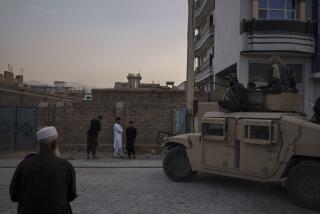NATO denies having plans for raids inside Pakistan
Reporting from Kabul, Afghanistan — The NATO force in Afghanistan denied Tuesday that the U.S. military intends to carry out ground raids inside Pakistan in pursuit of insurgent leaders hiding there.
The sharply worded statement underscored the extreme sensitivities surrounding the subject of militant sanctuaries in Pakistan, which were identified last week in a White House assessment of the Afghan conflict as a key impediment to subduing the Taliban and other insurgent groups.
In recent years, the U.S. military has carried out a small number of incursions into Pakistan, most of them by air. These raids generally trigger public denunciations by Pakistan, although its government is widely believed to have tacitly approved the drone strikes.
The New York Times reported in Tuesday’s editions that senior U.S. military officials believe they will soon be authorized to send American special operations forces into Pakistan’s tribal areas with the aim of capturing figures from the Taliban and a virulent offshoot organization, the Haqqani network.
U.S. Navy Rear Adm. Gregory Smith, the deputy chief of staff for communications for the NATO force, said there was “absolutely no truth” to reports of planned ground operations by U.S. forces inside Pakistan.
NATO’s International Security Assistance Force, or ISAF, has “developed a strong working relationship with the Pakistan military to address shared security issues,” Smith said in a statement.
“This coordination recognizes the sovereignty of Afghanistan and Pakistan to pursue insurgents and terrorists operating in their respective border areas,” he said.
The unusually vehement denial, however, comes amid intense policy debate over longtime ties between Pakistan’s intelligence services and groups such as the Taliban and the Haqqanis.
The sanctuaries have become a particularly urgent question; U.S. military officials have said publicly that hard-fought tactical gains in the south of Afghanistan could be reversed if insurgents are able to re-arm and regroup over the winter across the border in Pakistan.
On the Afghan side of the frontier, recent months have seen a dramatic increase in targeted raids by U.S. special operations forces backed by Afghan commandos, which NATO says have devastated the insurgents’ midlevel leadership tier. Such strikes have been concentrated in the southern Afghan provinces of Kandahar and Helmand, and also in the eastern regions, where the Haqqani network is most active.
On the Pakistan side, however, most of the strikes have been carried out by unmanned aerial drones, without involvement of ground forces. “Cross-border coordination has and continues to disrupt and dismantle insurgent networks in select areas,” Smith said in his statement.
Relations between Washington and the Pakistan government, however, have been highly fraught of late. Two months ago, citing NATO helicopter incursions into its territory, Pakistan shut down the main border crossing into Afghanistan for 10 days, effectively cutting the main NATO resupply route.
More recently, suspicion fell on Pakistan’s main spy agency, the ISI, for disclosing the identity of the CIA station chief in Islamabad, forcing him to flee the country.
More to Read
Sign up for Essential California
The most important California stories and recommendations in your inbox every morning.
You may occasionally receive promotional content from the Los Angeles Times.










